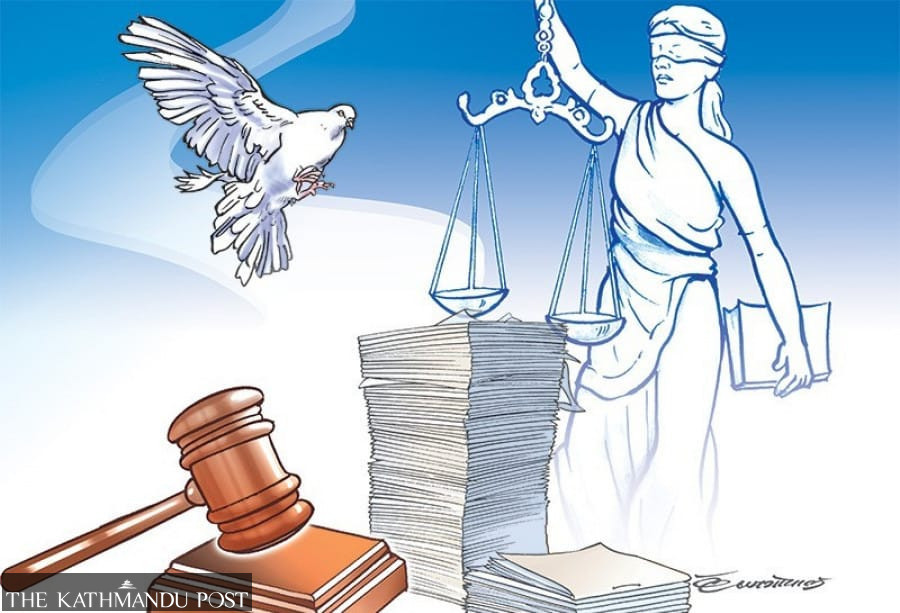National
Renewed push for transitional justice Act amendment
Revisions will be based on court’s verdict and international practices, government representative says.
Binod Ghimire
The government in October last year extended the terms of the transitional justice mechanisms until mid-July using a special authority to remove difficulties in the Enforced Disappearances Enquiry, Truth and Reconciliation Commission Act.
On Sunday, to make the term extension valid, the Minister for Law, Justice and Parliamentary Affairs Dhruba Bahadur Pradhan presented the October decision at the House of Representatives as required by the law. The government in July last year had extended the terms of the Truth and Reconciliation Commission and the Commission of the Investigation on Enforced Disappeared Persons by three months after bidding farewell to their chairpersons and members.
The terms of the leadership of the two bodies were not extended as the government expected that the Commission for the Investigation on Enforced Disappeared Persons and Truth and Reconciliation Commission Act 2014 to be amended within three months and the chairpersons and members appointed based on it. However, the term of the lower house expired last September before it could amend the Act.
The government extended the terms as per Section 42 of the Act, which authorises the government to ‘remove difficulties’, but such a decision needs to be presented in Parliament for validation.
“The decision to extend the terms of the two commissions has been presented in Parliament,” Man Bahadur Aryal, a joint secretary at the ministry, told the Post. “Now we are working on the bill to amend the Act and it will be presented in Parliament soon.”
In 2015, a full bench led by Justice Kalyan Shrestha had struck down the amnesty provisions in the Act, directing the government to amend the law. New amendments will be based on the apex court verdict and international practice of transitional justice, according to Aryal.
The government in July 2022 had registered the amendment bill in Parliament. However, the bill was never tabled in the House for voting as the CPN-UML objected to several of its provisions saying they were aimed at shielding perpetrators of rights abuses. Along with the victims of atrocities from the decade-long Maoist insurgency, human rights activists and national and international human rights organisations too objected to various provisions in the bill and asked for a revision.
However, the ruling parties were not ready to revise most of the provisions as demanded by stakeholders. The Law and Human Rights Committee of Parliament discussed the bill for days in an attempt to build political consensus as the government wanted it endorsed unanimously.
But the ruling and the opposition parties could not agree on whether or not to list murder as a serious violation of human rights. The government then decided not to present it for voting in the Federal Parliament.
Officials at the ministry say that the political leadership wants to see the Act amended and the transitional justice process taking its course. In the absence of chairpersons and members, the two commissions are largely defunct. “We cannot take any decision in absence of a chairperson and members,” Krishna Pudasaini, joint secretary at the Commission of Investigation on Enforced Disappeared Persons, told the Post. “Currently, our responsibility is limited to guarding the office.”
Eight years into their formation, the two commissions haven’t been able to make much progress towards providing justice to victims.
The truth commission has received 63,792 complaints since its formation in February 2015 while the disappearance commission, in its docket, has 3,223 complaints of enforced disappearances allegedly orchestrated by state security forces and the Maoists. After a preliminary investigation, the commission has identified 2,484 cases as genuine.
“The political leadership understands that further prolonging the transitional justice process will only make it more complicated,” a senior official at the law ministry told the Post on the condition of anonymity. “Also there is an increasing concern of the international community in the process, which is natural.”
Transitional justice has always remained one of the major items on the agenda of American delegates visiting Nepal. US Under Secretary of State for Political Affairs Victoria Nuland, who visited Nepal last week, said transitional justice was among the major issues she raised in her meetings with top Nepali politicians. “I specifically talked about four issues such as strengthening democracy, Nepal-US partnership, supporting Nepal’s prosperity, and transitional justice,” she told the media after the meeting.
Similarly, in his last month’s press meet, the US ambassador to Nepal Dean R Thompson said the international community was keen to see the transitional justice process move forward by addressing the concerns of the victims. He had also expressed confidence that the new Parliament would take up the bills related to transitional justice and resolve related issues.
Govinda Sharma Bandi, a former law minister, told the Post that the international community wants to see the transitional justice process concluded at the earliest. They also want to ensure that the momentum created by the previous government on revising the Act is not broken. “Not just the Americans, but other countries also want to see the Act amended and the transitional justice process take the right course. I am hopeful that the amendment bill will be presented in the House soon and it will get through,” he said.




 13.12°C Kathmandu
13.12°C Kathmandu














